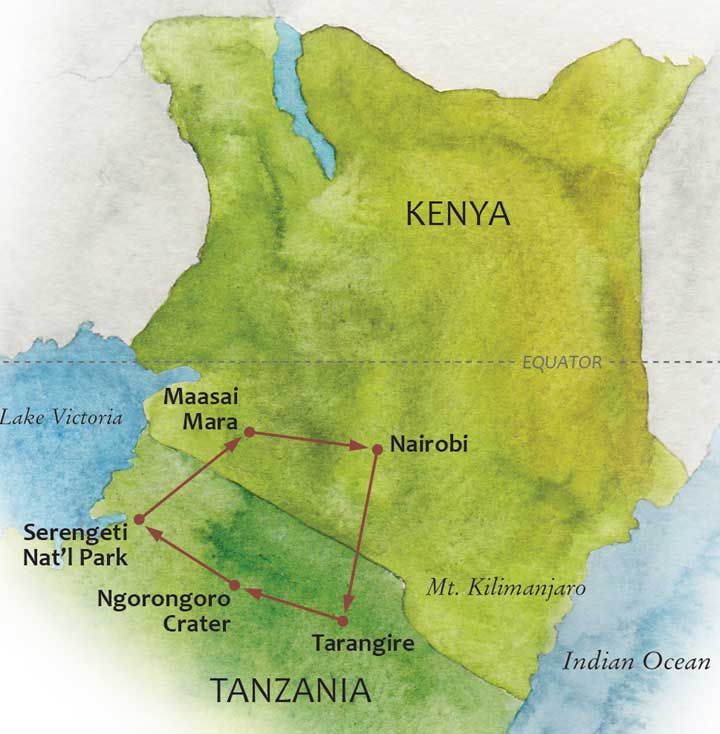Itinerary Details
Day 1
En Route
Our Micato adventure begins as we board our flight.
Days 2 & 3
Nairobi explorations
After arrival at Jomo Kenyatta Airport, we’ll be met by our Safari Director and driven to the contemporary Kempinski Villa Rosa. We’ll meet sassy pachyderms at the Daphne Sheldrick elephant orphanage, consort with the world’s tallest terrestrial animal at the Giraffe Centre, make a pilgrimage to the home of Karen Blixen—aka Isak Dinesen, one of Africa’s supreme laureates.
Day 4
Tarangire's animal superstars and Sopa Lodge
We’ll tour the informative National Museum, visit the inspiring Micato-AmericaShare Harambee Centre and after lunch fly in early afternoon from Nairobi to northern Tanzania’s Kilimanjaro International Airport. We fly onward to Tarangire National Park and the Tarangire Sopa Lodge, a classic example of beautifully designed modern lodge architecture.
Tarangire is an apt place to begin a wildlife safari. Home to just about all the headliner beasts, including a large and robust elephant population, Tarangire also shelters such rarities as the fringe-eared oryx and the long-necked gerenuk, a particularly winsome and creatively constructed antelope. Tarangire charms us with its exemplary African landscapes: acacia trees, brawny brown hills, sweeping vistas, clear nights of “soft velvet,” as Elspeth Huxley wrote. “[Like] a warm conservancy whose great dome was encrusted with all the diamonds in the world, and all the scents in the world were there too, changing like currents in the sea.”
Days 5 & 6
Zig-zagging into the fabulous Ngorongoro Crater
We drive from Tarangire up into the green Crater Highlands, weaving our way to the serene and view-rich O’ldeani Mountain lodge, from which we’ll make a full-day game drive into the fabled Ngorongoro Crater.
As geologic masterpieces go, Ngorongoro has had quite a career. It’s been a gigantic peak, perhaps a rival of Kilimanjaro, and, after it blew its snowy top in what must have been a rather impressive explosion (our forefathers over at the nearby Olduvai Gorge, busy getting their humanoid act together, probably saw it), Ngorongoro spent many millennia as an alternately quiet and occasionally bubbling lava lake. Now in an extended pacific mood, the crater is home to upwards of 25,000 personality-rich animals, who roam—as we will—over a sweetly lush area larger than 76 Central Parks.
Days 7 & 8
Game viewing and sundowners in the Serengeti
After stopping at Olduvai, the symbolic wellspring of our DNA, we drop down to the Serengeti, the known universe’s largest (and, happily for us, most wonderfully watchable) collection of illustrious mammals: elephants, giraffes, tumbling pool-fulls of hippos, elegantly slinking serval cats, zebras with incredibly muscular haunches (leading us to wonder why they were never ridden— very weak backs, that’s why), and scores of species more, all of them going about their business unconcerned by the likes of us. (“But make no mistake,” an old Africa hand once wrote, “these aren’t theme parks. The truest owners of these lands are the animals who roam them free and, if that’s their nature, fiercely.”)
We’ll soak up the essence of the Serengeti from the Serengeti Explorer, set on an escarpment overlooking the seemingly limitless plains, enjoying a sundowner after a game drive, watching clouds build up as the day cools, big clouds that “look like you could scoop them up with a spoon,” Elspeth Huxley wrote.
Days 9 & 10
The Maasai Mara, big game and beauteous landscapes
We fly back to Kilimanjaro International, then to Nairobi, and on to the Kenyan section of the Serengeti– Maasai Mara ecosystem, a world treasure, one with no counterpart, anywhere. (During humanity’s tenure, the closest any place on earth has come to equaling the Serengeti’s incredible wealth of wildlife may be paleolithic Siberia, with the ancient North American Plains another contender.) The size of Vermont (with Liechtenstein thrown in for good measure), the Serengeti-Maasai Mara ecosystem is, amongst much else, famed for the dramatic migration of its 1,000,000-plus wildebeest and 750,000-or-so zebras (and the intense attention that migration gets from predators, both mammalian and reptilian). Though the migration reaches seasonal crescendos, the movement of animals—north after the Long Rains, south as the rains return to nourish the southern plains— is more or less continual, and the sight of a two or three-mile-long train of animals on the move is extremely memorable.
Up here in the system’s north, the landscapes are grandly varied but tend to be more green (which is why the migration heads up here, in search of water), with somewhat less savannah than in the south. We’ll be staying in the heart of the Mara North Conservancy, at small, elegant Elewana Elephant Pepper Camp, wonderfully secluded in a luxuriant grove of fig and elephant pepper trees. Game viewing here is superb, with the full and vibrant roster of Africa’s fabulous beasts in residence. And we’d feel remiss not nothing optional and thrilling balloon excursions; wafting over the Mara in the piercingly fresh and golden morning, floating over elephants and hippos, feeling a mild and worthy intoxication-by-grandeur, is one of those things that, having done, we wonder how on earth we ever contemplated not doing.
Day 11
Back to Nairobi and thence to home
We fly back to Nairobi in the morning for some relaxation and maybe a swim or spa visit at the Four Points by Sheraton at the Nairobi Airport, before being escorted to the airport for late-evening flights by our steadfast Micato Safari Director.
Day 12
Connect in Europe with homeward flights
Already nostalgic for safari life, we arrive home.
